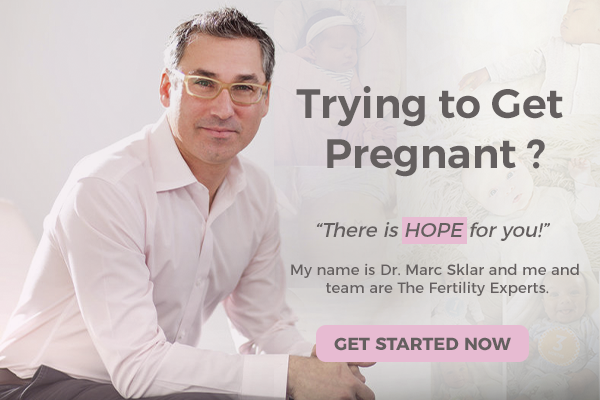Period 101 TIPS: What girls wish they knew about their period with Nat Kringoudis and Marc Sklar
Transcription:
Dr. Marc Sklar:
Hi everyone, and welcome to another episode of Fertility TV. I’m Dr. Marc Sklar, the Fertility Expert, and I work with couples from all over the world, helping you conceive naturally. If you want more information on how you can get pregnant naturally, then make sure you subscribe to my YouTube channel by clicking that bell, so that you know when I put out another video. Today, I am talking with a good friend and a fellow acupuncturist and Chinese medicine doctor, Nat Kringoudis. She comes to us all the way from the other side of the globe, in Australia, and she has a women’s health clinic and fertility clinic in Melbourne, Australia. She’s also an author and a speaker, she does tons of wonderful things, she puts out wonderful and amazing products to educate all of you from all over the world.
Dr. Marc Sklar:
And today I’m talking to her about her new book called Beautiful You, which is going to be really impactful in helping all of you talk to young women, young girls, and hopefully your future daughters about their bodies, and how they can start to take care of themselves now so that they don’t have fertility issues in the future. So if you want more information on this, then stick with me and keep watching as I talk to Nat. I’m here with Dr. Nat, and she has written a wonderful new book entitled Beautiful You, and it’s really, really important because she takes a perspective taking us back to changing our education and really trying to change the way we think about our bodies, fertility, and education from a generational perspective. So Nat, thanks so much for joining, I’m really excited to have you with me.
Dr. Nat Kringoudis:
Thank you so much for having me, it’s always a pleasure, Marc. Anything you ask, I’m like, “Yep. I’ll be there, let’s go.”
Dr. Marc Sklar:
Well, look, I love having you on, and I know you are doing such amazing work in spreading some really important information. Not just about women’s health, but that’s always awesome, and not just about fertility, but really you’re trying to change things in a very important place in terms of education, and how we talk to our children and young women as they’re growing up so they understand their bodies more. So tell me, how did this book start for you? Where did this come from?
Dr. Nat Kringoudis:
Well, just like you, however many years ago, many now, recognized that there was this definite gap with fertility, that we really only were prepared to fix it when it was broken or when we were ready to have children. Maybe it wasn’t broken, but we didn’t take the time to learn about ourselves until such a time that it was almost a factor or a problem. And so really recognizing that and thinking, “Okay, well hang on, how do we fix it before it’s broken? How do we educate?” And I very much made that a focus of my work, and then still had another epiphany and went, “Hang on, we need to speak to young women.” We need to be changing this trajectory as the next generation, to be able to not only lead by example, but have the conversations that we never got to have surrounding our fertility.
Dr. Nat Kringoudis:
I mean, it’s not anyone’s fault, but I know definitely I certainly… No 20 year old, really, most 20 year olds don’t want to have a baby. But I think just them understanding the importance of their fertility, and it’s not an easy conversation to have, I think, because we’re not collectively having it. But I’m really inspired to try and encourage women to do that and to speak. Even from the beginning, when your daughter asks you, “Mommy, where did I come from? How did I get in your tummy?” Those questions happen, and I feel like for too long we’ve fed children lies. We’ve said, “The stalk delivered you, or the doctor puts you in there.” Or whatever it might be, because we’ve been uncomfortable having those conversations. But if it’s this age appropriate conversation that’s organic and just evolves over many years, I feel, and in my understanding, we would have a very different landscape when it came to fertility.
Dr. Marc Sklar:
Oh yeah, absolutely. It’s funny you say that about telling your children that the stalk came or something like that. Because I mean, I don’t have girls, I’ve got two boys, but for me, sex education with them is still very, very important. And my older son has been very inquisitive from a very young age, but my younger son, not as much. I mean, if he happens to be in the room when we’re having a conversation, then he’ll ask questions, but he doesn’t really care to ask. But we’ve always been really upfront and honest about how things work and where we all come from and the bigger plan in general, and he’s always taking it, maybe sometimes there’s a little chuckle here or there. But he just turned 11 last week, and he knows much more about this sort of thing than many of his friends, and it’s not a big deal to him. And I think just like you’re saying, if we make it not a big deal, then it’s not a big deal, this is just fact.
Dr. Nat Kringoudis:
Absolutely, and I think I definitely missed out on that, I didn’t get all the facts and so I definitely wrote the book for the younger me. It was because it wasn’t, probably, appropriate at the time, but like you said, if you can have these ongoing conversations… And I definitely talk with both of my kids in front of each other about whatever is being asked. And it’s all very age appropriate, I’m not giving them information that I don’t think is beyond their ability to understand. When Livy first started asking you about egg and sperm, I didn’t give it a whole rundown but I explained it in a basic way. And I think that that’s what needs to happen, and we’ve shied away from that for too long.
Dr. Nat Kringoudis:
So, I get excited by that. And then I’m like… Well, I have the opposite to you, my eldest, Livia, is so not worldly, so not interested in knowing and I try and prompt questions all the time and she’s just not interested. And I’m like, “When are you going to ask me the big ones?” And she gets it to a degree, but it’s so frustrating in my industry, I’m like, come on. Whereas Jordy, my son who’s eight, is probably a little bit more clued up because he has a big sister and he’s curious to learn. But it is about having these conversations and it is about us changing that trajectory, and what we found in our research when writing the book was that 40% of mothers didn’t understand the difference between their vagina and their vulva. So I was like, “Well, how the heck are you educating your daughter if you don’t understand that yourself.”
Dr. Nat Kringoudis:
They were also extremely dissatisfied with the education system and what they were being taught at school, 80% of mothers said they were dissatisfied, but not necessarily equip themselves to have the conversation. And a large portion of teens said that they would Google, obviously, we all Google. They would Google the answers to their questions when it came to their sexual and reproductive health. And so we have to do something about this because if you’re Googling, at that age, anything to do with sexuality lead to porn, and then all of a sudden it’s a slippery slope because you’re looking at that going, “Well, heck I don’t look like that or it doesn’t work like that for me.”
Dr. Nat Kringoudis:
And so I think having these conversations is important for not just one reason and not just fertility, but for so many different facets. And that’s what I’m excited to be able to say, okay, if you, as a mother, don’t feel like… Or you as a woman, not even a mother. An auntie, a cousin, everyone that reads, it says, “Why are you targeting this at young women, we all need to know this stuff.” And I’m like, “Well, I assume we all have a basic 101, but many of us don’t.” So I think that, yeah, that becomes extremely important.
Dr. Marc Sklar:
Yeah. I mean, the first thing I thought of when you said when they have questions the first thing they do is Google. I was like, “Oh, no.”
Dr. Nat Kringoudis:
Right, right.
Dr. Marc Sklar:
Porn, that’s what’s going to come up. I mean, that’s the only thing that could when you type in certain words, it’s like, boom. So that would be scary alone, and just to think now you’ve got my mind thinking about my kids. But we’ve trained them to come to us first.
Dr. Nat Kringoudis:
Right, totally. And Livy did that, she one day came home from school and she came out and I was sitting in the yard and she’s like, “Mom, I need to talk to you.” And I was like, “What’s wrong?” She said, “It’s just one word and it’s period.” And I was like, “Oh,” I said, “You know about your period, sweetie, we’ve spoken about that before.” And she said, “Yeah, I know but the teachers… We had a big meeting today about it.” And I said, “Oh, okay. And what did you learn?” And she said, “I learnt that it’s going to be terrible. I’m going to be in a lot of pain and I’m going to be… Basically, that’s just what happens to women.” And I was like, “Okay, no, that’s not what happens.”
Dr. Nat Kringoudis:
And so that’s what I mean, there’s still this education that needs to happen. You and I are here to fix period problems. The nice part about fixing a period problem is your fertility improves tenfold, so it’s none of that separate. So long as we’re making them aware that one thing follows the next, I think that is really important. And like I said, I understand teens don’t want babies or probably don’t care about their fertility, they care about being bloated or having acne or gaining weight or not feeling good, and so we make it about that. But longterm benefit of that is that fertility stays intact, and that their hormones get to mature as they should.
Dr. Nat Kringoudis:
And there’s a big education piece, obviously, around hormone contraceptives in the book, you can’t have a book like that without that information. But really teaching mothers that when you shut down a teenager’s hormones, it’s not until she comes off that contraception that you are starting the system up in the very same place that you were actually holting it. And that’s scary, and that’s why many 30 year olds don’t have a period because when they started the pill at 14 or 15, they didn’t have one then either, and so why would they have one now? Because they’re mature as a 14 year old at 30. So I think these conversations are important and we need more information.
Dr. Marc Sklar:
Absolutely, which is why I was so excited to have you on. And to their mom’s credit, or to their parents’ credit for that matter, I’ve worked with a lot of teenage girls who were diagnosed with PCOS, or they were having irregular cycles or whatnot, and at least their mom or parents had the wherewithal to bring them in to start to get care at that young age. But I also speak to so many people, as I’m sure you do, who had those same symptoms when they were 16, they never got proper treatment for it, just put on the birth control as you mentioned, and then they come in at 30, 35 wanting to get pregnant.
Dr. Marc Sklar:
And so then we’ve got a big, long catch up game to play to try to make these important changes, to get them to the place where their hormones are balanced, they’re healthy, and they’re able to get pregnant. So in terms of knowledge and education, what are some key points that you want to share that they could also dive deeper into, into your book, that someone could take away from this interview and say, “Okay, well, these are the things that are really important.”
Dr. Nat Kringoudis:
Yeah, I think understanding what’s normal and what’s not. I think we panic when it comes to teenagers, if their periods are irregular and they’re at a young age, we panic, we take them to the doctor and often that’s what’s prescribed. So teaching mothers and daughters, or women, to look at their symptoms as clues, what’s your body telling you, is this a reason to be upset or is there something else at play, what other factors come into it? The book goes really deep into, these are your symptoms, this is what it’s telling you. And so I’m really keen with that, and I use a lot of Chinese medicine terminology as well, things like face mapping for acne, what’s your body telling you as opposed to where your acne is. And that’s just one example of many.
Dr. Nat Kringoudis:
I dive deep into the emotions as well, what are your emotions telling you if you are always one way or another, always sad, always worried, what impact that has on your hormones and how we treat it. So there’s a big emotional element too, because I really think that’s a missing piece. I really, really think that part, if we can get that right, everything follows, but we don’t often get that right and that’s a challenge. And then it also goes into nutrition, which I think we need to make teenagers responsible for, because it gets to this turning point and then all of a sudden we have to do a crash course on what we need to support our hormones. So my thought process around that was, “Well, they’re probably preparing their breakfast and their lunches, so how can I inspire them to make food that is going to support their health rather than not?”
Dr. Nat Kringoudis:
And, again, I play into the acne and the bloating and this is why you want to eat this way, not just, oh your hormones will be happier. Because again, teenagers don’t really care if their hormones are happy or not, they just care about how they look and feel. I think they probably some… I talk about sex, when is it the right time, should I be having sex? So it’s definitely… my mentor, she basically said it’s the modern day, Are You There, God? It’s Me, Margaret book but better.
Dr. Marc Sklar:
I’m sure it’s better and more appropriate for our times.
Dr. Nat Kringoudis:
Yeah, absolutely. Absolutely.
Dr. Marc Sklar:
Well, the emotional piece is huge, right, for all of us. It’s a big piece for us just as adults, and teenagers are going through so many changes and have a hard time understanding what’s going on. Hormones are acting up and changing and shifting, and that changes the way they feel, so emotions is absolutely a big piece. And diet, I talk to my kids now, they know what they should and shouldn’t be eating. So when they ask for something, I’m like, “Well, do you think that’s the right choice?” We can absolutely be doing that for teenagers, right? They just don’t always care to know, or haven’t had the information to make the right choices.
Dr. Nat Kringoudis:
Absolutely, and they’ll always come back to what home-base feels like. So, I know I strayed when I was a young woman and I was living on my own, and when I say strayed, I ate fast food for probably a year on end and felt awful. And that wasn’t my normal, I grew up in a very healthy household and so eventually that didn’t feel good anymore, and I came back to what was home for me, and that was lots of amazing whole foods. And so again, that’s what I’m saying, young women don’t want to be preached to, but they will follow the lead. So this is what I’m saying, it’s our responsibility as mothers, as parents, as women, as adults, even men, to do that, and to take that responsibility seriously. And it’s a privilege, I see it as a privilege to be able to support women.
Dr. Marc Sklar:
Absolutely. So, on that note, because you said that they’ll always come back to what home is, and I always remember the way I was raised and what my mom used to cook, and always leaned on that, right? So, leading by example, is there any aspect of the book that kind of talks to the parents and so on?
Dr. Nat Kringoudis:
Yeah. I definitely have written it somewhere in the middle, trying to say, “Oh, you know what? I bet your mom wish she knew this, and I bet you she wish she knew that.” And so I try and enroll both, and I would encourage any mother to read it before giving it to their daughter, just to make sure, A, it’s age appropriate, but also, B, that they’re understanding themselves as well. So there definitely is… I talk about menopause in the book, not in great detail, but again, something that we just don’t talk about.
Dr. Nat Kringoudis:
And so I definitely know a 15 year old is not caring about menopause, but they might like to understand why their mom or their aunt or their grandma or whoever is behaving or… when I say behaving, it’s probably not the right word, but it’s moody or keeps on talking about these hot flushes, what does that even mean, and why are they there? And talking about setting up the foundation so that doesn’t have to happen to you. And so it is appropriate for, yeah, everyone gets something out of it, I’m hopeful of anyway.
Dr. Marc Sklar:
Awesome. Well, first I want to say thank you for writing the book because it’s so important to start to change the way we educate our children, and changing things generationally. And we’ve got to start now with that, so that we make changes generations from now. So really, I applaud you for writing that book and taking that movement upon your shoulders and moving it forward, so thanks so much for that. And thanks for joining me today and sharing the good word with all the information you have to share.
Dr. Nat Kringoudis:
Thank you, Marc, it’s a privilege. And as always, thank you for having me, I love being here.
Dr. Marc Sklar:
We’re going to put a link, and I’m going to put a link for your book, but what’s the best place for them to follow you? I’m sure you’re on all sorts of platforms, as I know you are.
Dr. Nat Kringoudis:
It’s Nat Kringoudis on old platforms, and you’re going to want to put a link there because my surname is up there with snuffle up against from… But it’s just Nat Kringoudis or Nat Kringoudis on all handles, so I think it link’s a great idea.
Dr. Marc Sklar:
We will put a link down below in the comment section. We will also, when we share this on Facebook and Instagram, we will tag you so that everyone can easily find you for that as well. And to everybody watching, thanks so much for watching. Again, if you are not a subscriber to my Fertility TV YouTube channel, please do just hit that bell. Please comment below, let Nat and I know how valuable you found this information. And if hearing some of these words, one, you’re going to start to change the way you think about educating your children, who you have now, or those that will come in the future, and two, if you’re going to pick up her book to educate yourself as well. So leave a comment below, let us both know how this interview has affected your life and your thought on this situation. And Nat, thanks so much for joining once again.
Dr. Nat Kringoudis:
Thank you.
Dr. Marc Sklar:
Bye everyone.
H.O.P.E Coaching – Heal naturally to Overcome infertility & get Pregnant by Empowering your body
Who is this for: Any women trying to get pregnant for +6 months
It includes: 60 minutes coaching call with Dr Sklar, The Fertility Expert
During this 1 hour online fertility consultation with Dr Sklar, or his team of natural fertility experts, you will get all the fertility support you need, we will review your case, give you recommendations and create a next steps for a personalized plan to help you get pregnant
The H.O.P.E Coachingis a 60 minutes call where we will go over your fertility case and give you customized recommendations, that work for YOU. Me and my team of fertility doctors are here to help you improve your fertility to get pregnant.





